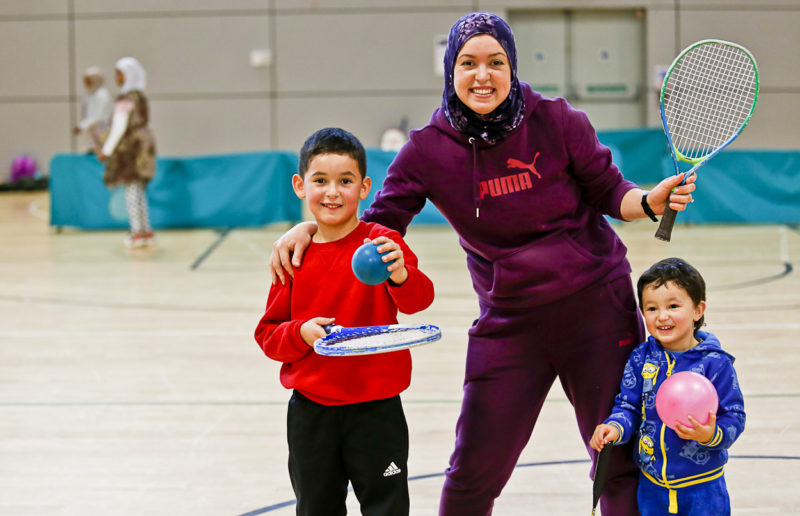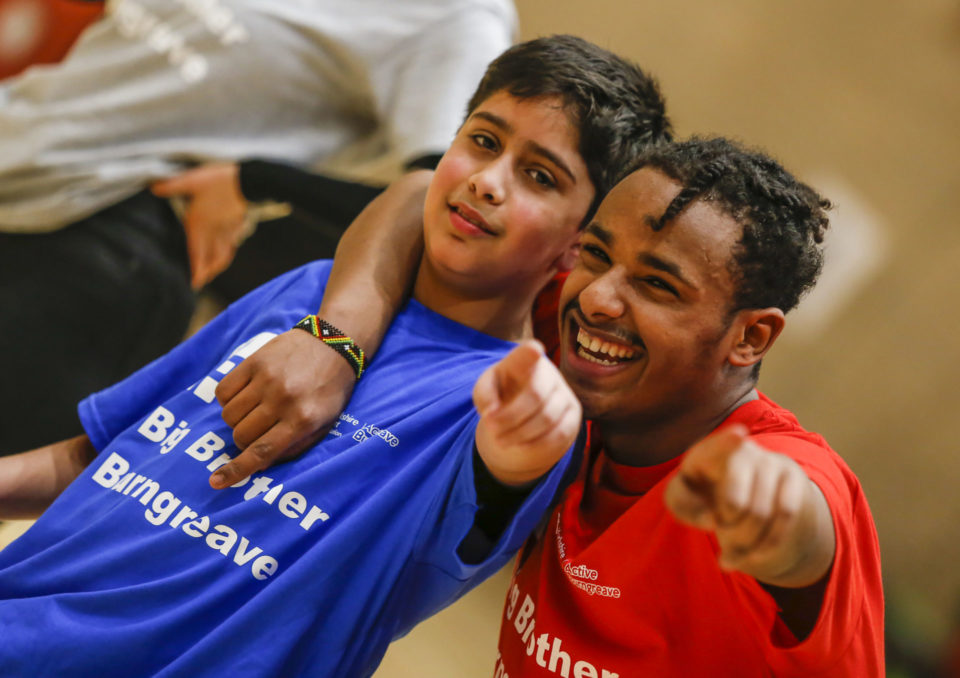
Yorkshire Sport Foundation – Active Burngreave
Following on from last week’s blog (Sport as an asset for Community Building) about the community building potential of sports activities, this week we shine a light on some examples of how sports organisations are beginning to shift their practice to take a much broader view of the neighbourhood.
We have been in conversation with Yorkshire Sport Foundation (YSF) and their colleagues locally and in the national network to explore how a focus on what’s strong in neighbourhood life can change the conversation when it comes to determining positive outcomes for people.
The Active Burngreave project in Sheffield is an example of how by parking their agenda around physical activity YSF have been open to discovering what people care about in the neighbourhood.
This has meant a lot of time and energy spent building relationships and trust with people, understanding ‘the way we do things around here’ and being more open to the wishes of local people where they have energy for change.
The approach to Discovery is what makes the Burngreave story special, it involved a process of building relationships and understanding with and between local people, of understanding that there were lots of groups and informal associations in place already which were very well connected but not on the basis of sport and not to approach them on the basis of ‘having the answer’ but rather to look at how we can journey together to connect more people in the neighbourhood, find out what is important to them and support them with that.
This has led to a number of local groups and individuals organising and facilitating activities for their community. Fir Vale Community Hub (a local community group which provides advice and guidance for the community relating to accessing services) have delivered an Active Body Active Mind project for the last year. Each week women take part in an hour of activity and then nutritional sessions. Women are then tasked with sharing that message with friends and family, passing on their new learned skills.
‘I looked after my father-in-law and my husband – he was in bed for 3 years and I stayed at home looking after the children. I started the class and started to get out more maybe about 8 or 9 months ago. I’ve lost 1 and half stone, I’m now more happy and losing weight’ – Active Burngreave Participant
Saalik (local groups of volunteers connected to a local Mosque) trains local young men as sports leaders and volunteers, creating local role models for participants. Many of the volunteers feel it is their ‘duty’ to provide support to younger peers and help them to make positive life choices.
This project is an example of the ‘right staff’ ensuring the success of a project. The Project leader Imran Ali has grown up in the area and been providing youth sessions and support for the past 15 years. He is well known and a role model to the young men in the community.
A participant summarised his impact: ‘Imran understands how young people act and what they need. He’s developed his own style- he knows we don’t want it too strict, but we respect him so we all behave. We are a family here and we all contribute. These sessions allow us to give something back to Imran, thank him for everything he has done for us. We come to enjoy it ourselves but also to show respect to our family and community.’
In previous days, sports development roles would have focused purely on sport as the beginning of the conversation – an approach which can close down as many opportunities as it opens up, especially for folks who don’t view sport as their thing and therefore those who are most likely to benefit from a different opening conversation.
This tendency towards organising events, activities and projects for communities rather than with them meant that the energy for change was often coming from the Sports Development practitioner themselves rather than the community – as we’ve seen in other sectors this approach is not only very labour intensive it is also self-limiting, it sets the dynamic to ‘we’ll organise this for you’ placing the call to action squarely in the field of ‘come along to OUR event.’
Active Burngreave has sought to work with the energy for change from within the community and connected people around what is already present and working well in the neighbourhood. Thus many of the activities established are run by local people which places the sustainability of outcome in the heart of the community and encouraged community members to come forward offering their gifts and skills.
Safiya Saeed, a Community Development Worker, provides mentoring support to local people to make best use of their skills to start new activities and to develop their skills further.
A small group of ladies have received Leadership in Running Fitness Training and have developed a Burngreave Running Group which meets weekly. The group meets at Fir Vale Healthy Living Centre and have various running routes for beginners and improvers. This group entered the Sheffield Race for Life Event and will be entering more events in 2018.
‘This project has quite simply changed my life. I was lonely and isolated, like many women are here. I have little English and am not confident to go out of the house. I now have the confidence to go out once a week, and do something for me. It is the highlight of my week and gives me hope that things can change’ – Active Burngreave Participant
Local shop owners have completed FA Coaching qualifications and developed a football session in the green space next to their shop, engaging young people who were stood around on the street with nothing to do.
A local café owner has undertaken Walk Leader training and a Community Spots Leadership Award, in order to provide activities for men who come to his café daily, with little or no money and have nowhere else to go. He shuts his café a few hours every week and walks the group up to a nearby Basketball court.
Members of the local Roma community have come forward wanting to encourage their community to be more active. They have completed FA coaching qualifications and gone on to organised football sessions. They have provided opportunities to boys who have never experienced competitive sport or a team environment before.
Community leaders have continued to engage with the local community and new members are joining all the time. Project volunteers actively seek new participants during street walks, where they walk around local areas at evening times, aiming to encourage more young people to get involved. Actively walking the streets of their community, volunteers are able to successfully engage young people who were involved in low level anti-social and nuisance behaviour.
One young man has taken part in activity for the first time. He was a 12-year old smoker who was often involved in anti-social behaviour. Since the start of the project he has given up smoking and his behaviour has improved dramatically. He attends school regularly and is now a role model to other young Roma/Slovak boys in his community.
Using our example from last week the mode of operation has been a ‘Spartan’ one where the on pitch/in game activity has been given pre-eminence. In this example the ‘Corinthian’ spirit shines through, it is much more about togetherness and mutuality.
 Kathryn Mudge the Development Manager at Yorkshire Sport recognises the benefits of approaching neighbourhood working from a Corinthian mindset “The project although sport and activity focussed, remains driven by what is important to the community. Community Leaders understand social issues their community are facing and are passionate about reducing inequalities.”
Kathryn Mudge the Development Manager at Yorkshire Sport recognises the benefits of approaching neighbourhood working from a Corinthian mindset “The project although sport and activity focussed, remains driven by what is important to the community. Community Leaders understand social issues their community are facing and are passionate about reducing inequalities.”
“This project is focussed on achieving social outcomes as opposed to simply increasing participation in sport. Community members have identified what solutions and gifts they have to bring, and have gone about making changes themselves- trusted individuals providing the ‘right activities’ in their own style.”
In the same way, we have seen how sports clubs can often be sources of great social capital and support – but often removed from the wider neighbourhood. In Burngreave attention was given to the building of trust and relationships that forms the basis of ongoing dialogue. Rather than trying to lead with a programme of sports activities, and hoping to build relationships that way, they have started their journey on the basis of what is already working well for people in the neighbourhood of Burngreave and how might those things be better connected.
In the sports development sector as in so many others the focus on delivery of sports activities and programmes has often been the only call to action; but we are now seeing the emergence of a changing conversation and a recognition that organisations can’t continue to view communities through the silo of their funding regimes.
At Nurture Development, we love to hear stories of how practitioners on the ground are recognising that the communities that they serve are more than the sum of the issues which affect them, just as the people they work with are greater than the sum of the labels that have been applied to them. In this story we’ve seen how in order to be as effective as a ‘Spartan’ we need to be as affective as a ‘Corinthian’.
‘Honestly speaking I am not the same, this course has made me gain what I lost in the past. It’s the eye opener to me and reminds me I can do more than I was expecting. I am really looking forward to do more’ – Active Burngreave Participant
Chris Chinnock & The Participants of Active Burngreave.
